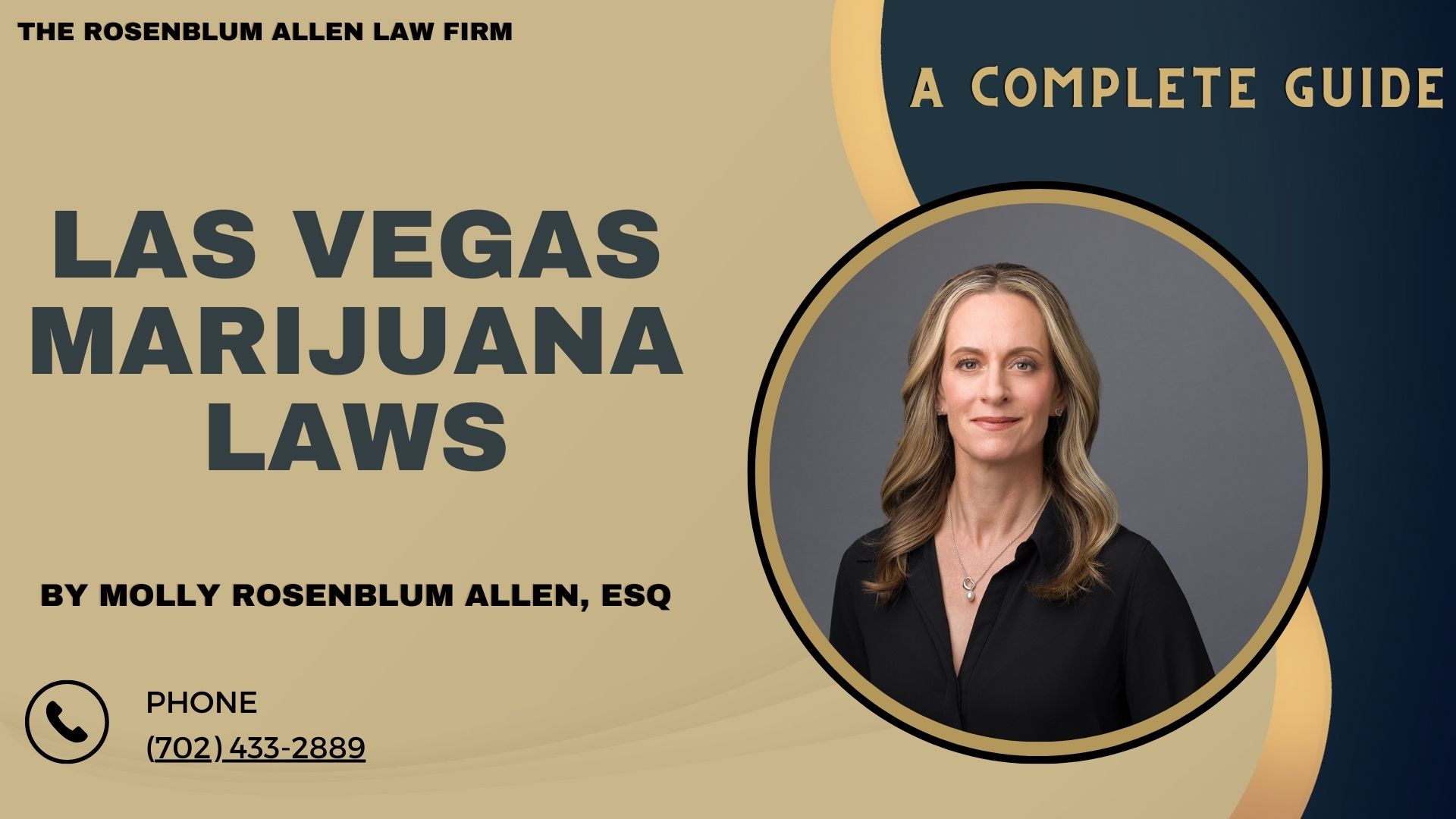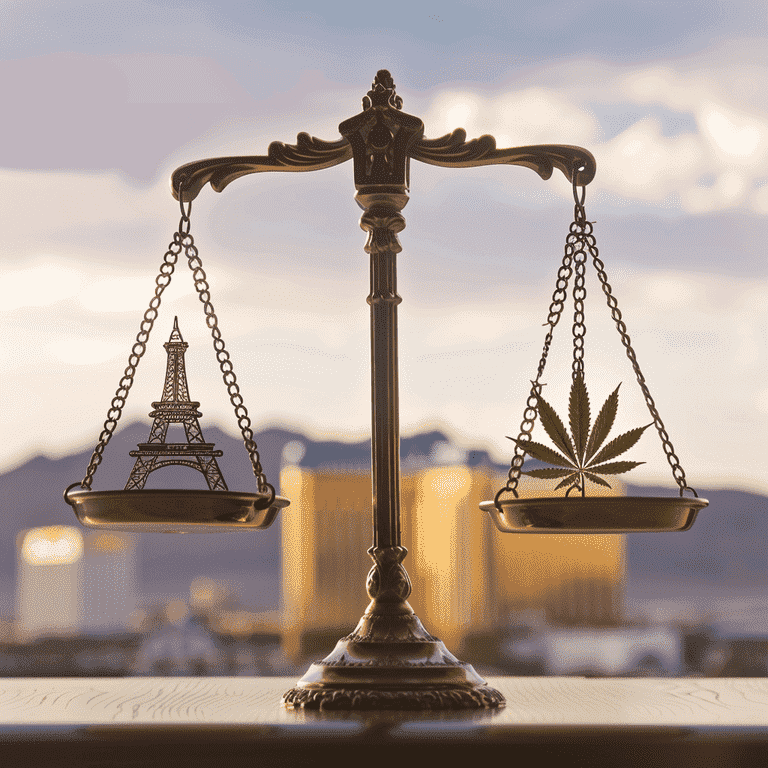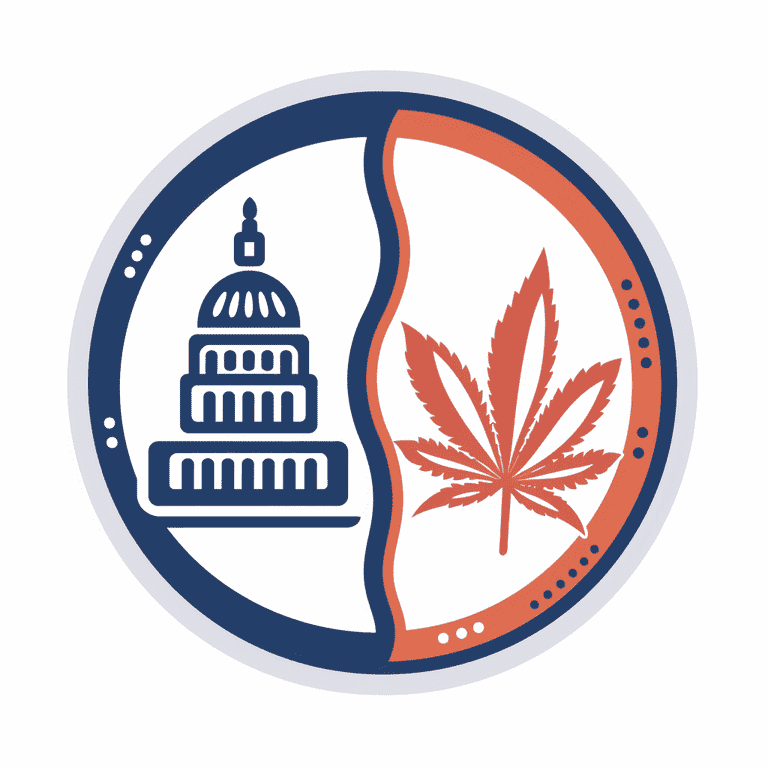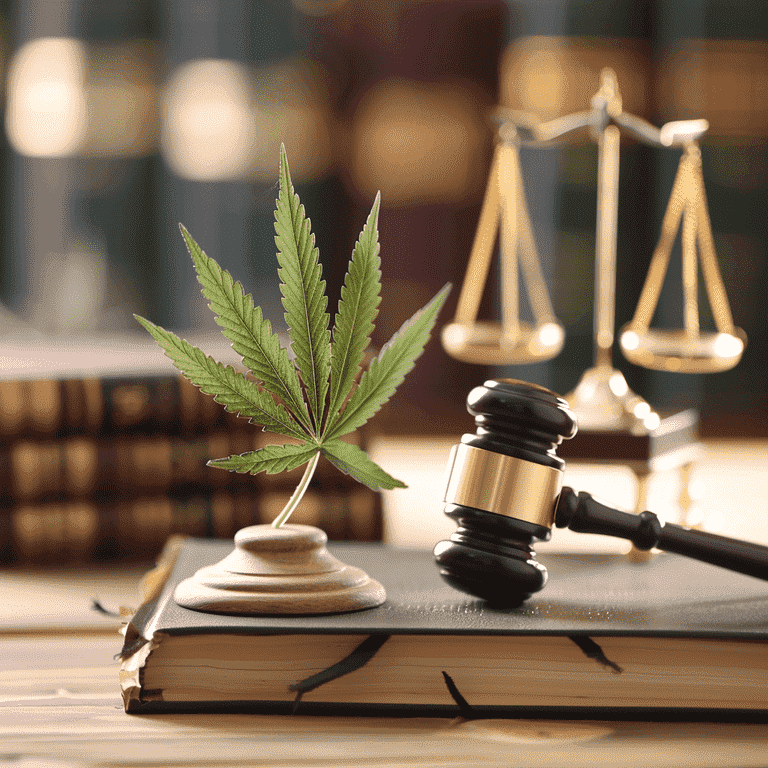If you’re in Las Vegas and find yourself worrying about the ins and outs of marijuana laws, you’re not alone. The evolving legal landscape can be confusing. This is especially true for the nuances of Nevada’s regulations on recreational and medical marijuana use. We designed this guide with you in mind. Are you a concerned citizen fearing potential charges? Or are you just someone aiming to stay informed? Let’s dive into the complex world of Las Vegas marijuana laws together. I’ll ensure you know how to navigate these waters confidently.

Understanding Nevada’s Marijuana Legal Framework
Nevada takes a multifaceted approach to marijuana, encompassing both recreational and medical use. It’s crucial to grasp these distinctions to avoid unintended legal complications.
Recreational Use
Nevada permits recreational marijuana use under specific conditions.
Age restrictions and legal possession limits: You must be 21 years or older to possess or use marijuana legally. The law allows possession of up to 1 ounce (28.5 grams) of marijuana or up to 1/8 of an ounce (3.5 grams) of concentrated marijuana.
Public consumption laws and penalties: It’s illegal to consume marijuana in public places, including casinos, bars, and vehicles. Violating this law can result in a fine of up to $600.
Medical Use
Nevada offers a medical marijuana program with different rules for those with certain medical conditions.
Qualifying conditions for a medical marijuana card: Conditions such as chronic pain, cancer, PTSD, and more can qualify you for a card.
How to apply for a medical marijuana card in Nevada: The process involves obtaining a recommendation from a qualified physician, completing an application through the Nevada Department of Health and Human Services, and paying the required fee.

Dispensaries and Legal Purchase
Understanding where and how you can legally purchase marijuana is vital to complying with Nevada’s laws.
Licensing requirements for dispensaries: The state must license them, ensuring they meet strict regulatory standards for operation.
Restrictions on purchase amounts for recreational vs. medical use: While recreational users are limited to purchasing up to 1 ounce of marijuana or 1/8 of an ounce of concentrate at a time, medical users can purchase more significant amounts as prescribed by their healthcare provider.
This dive into Las Vegas’s marijuana laws covers the foundational aspects of recreational use and medical use. By understanding these basics, you’re better equipped to navigate local regulations’ complexities. You can ensure your use remains within legal bounds. In the following sections, stay tuned for more detailed discussions. We’ll cover legal implications, employment considerations, and navigating federal versus state law discrepancies.

Legal Implications of Marijuana Use in Las Vegas
Navigating the legal waters of marijuana use in Las Vegas requires understanding various laws. This is especially true for DUI, possession limits, and public consumption. Let’s unpack these to ensure you’re in the clear.
DUI Laws
Driving under the influence of marijuana is a serious offense in Nevada. The law is stringent.
Legal limits for marijuana impairment: Nevada has set a blood concentration limit for THC (the psychoactive component in marijuana) at two nanograms per milliliter. Exceeding this limit can lead to DUI charges.
Penalties for driving under the influence of marijuana: Convictions can result in fines, jail time, community service, and mandatory DUI classes. The severity depends on the number of offenses and specific circumstances.
Possession Over Legal Limits
Accidentally exceeding the legal possession limits can lead to significant legal trouble.
Penalties for possession of marijuana over the legal limit: Penalties range from fines to potential jail time, depending on the amount possessed beyond the legal limit. Charges escalate from misdemeanors to felonies as the quantity increases.
Distinctions between misdemeanor and felony charges: Possession for personal use often falls into misdemeanor territory, but intent to sell or large quantities can elevate charges to felonies.
Consumption in Public Places
Understanding what constitutes public consumption is vital to avoiding fines and legal issues.
Specifics on what constitutes public consumption: Consuming marijuana in any form (smoking, vaping, eating) in public spaces—parks, sidewalks, casinos, and vehicles—is illegal.
Fines and penalties for public consumption violations: Penalties typically include fines, but repeated offenses could lead to more severe consequences.

Employment and Marijuana
The intersection of marijuana use and employment is a hot topic. Nevada’s laws provide specific guidelines.
Employer Drug Policies in Nevada
Nevada employers have the right to establish drug-free workplace policies. However, there are nuances to be aware of.
Rights of employers to test for marijuana: Employers can require pre-employment, random, and post-accident drug testing.
Implications of positive tests for employees: Testing positive can lead to refusal of employment, termination, or other disciplinary actions, depending on company policy.
Medical Marijuana and Employment
Holding a medical marijuana card brings certain protections, though they have limits.
Protections for medical marijuana cardholders: Employers in Nevada must accommodate medical marijuana users, barring certain safety-sensitive positions or federal requirements.
Limitations of protections in the workplace: Despite state protections, federal law and specific job roles may override these, leading to complex legal situations.
Understanding these aspects of Las Vegas marijuana laws helps stay compliant. It also helps navigate potential legal issues with confidence. Knowledge is your best defense. It can help you avoid DUI charges and understand your rights in the workplace. Stay informed, stay safe, and remember, seeking legal advice is always a smart move when in doubt.

Federal vs. State Laws on Marijuana
The intersection of federal and state marijuana laws can be confusing and concerning. This is especially true for those worried about potential charges. Understanding this dynamic is crucial for navigating the legal landscape effectively.
The Federal Classification of Marijuana
At the federal level, marijuana remains classified as a Schedule I controlled substance. This classification implies:
Implications of federal scheduling on Nevada residents: Despite state legality, federal law prohibits marijuana possession, use, and distribution. This discrepancy can affect everything from federal employment to housing.
Navigating Federal and State Law Discrepancies
Living in Nevada, where state laws permit marijuana use, requires awareness. You must consider situations where federal law may override state law.
Advice for residents and visitors in federal properties and lands: Marijuana possession or use on federal property, including national parks and government buildings, remains illegal under federal law. Caution and awareness are essential when on or near these properties.

Legal Defense for Marijuana Charges in Las Vegas
Facing potential marijuana charges can be daunting, but understanding your defense options can empower you to navigate the situation confidently.
Common Defenses Against Marijuana Charges
Legal defenses can vary based on the specifics of the charge. Some common strategies include:
Medical necessity: For those charged with possession, demonstrating medical necessity and compliance with state medical marijuana laws can be a defense.
Illegal search and seizure: Challenging the legality of how evidence was obtained can be a potent defense if law enforcement violates constitutional rights.
Finding the Right Defense Attorney
Selecting an experienced defense attorney is crucial for navigating marijuana charges effectively.
What to look for in a defense attorney specializing in marijuana laws: Expertise in Nevada’s marijuana laws, a track record of successful defenses, and a strategic approach tailored to your case are vital qualities.
The importance of experienced legal representation: The right attorney can navigate the complexities of your case, advocate on your behalf, and work towards the best possible outcome.

Preventive Measures and Best Practices
Staying within legal boundaries requires ongoing awareness. It also requires adherence to best practices related to marijuana use in Nevada.
How to Stay Within Legal Boundaries
Adopting responsible behaviors can prevent legal issues:
Tips for responsible use and possession: Keep marijuana use private, within legal limits, and away from public spaces. Always purchase from licensed dispensaries.
Understanding the Consequences of Violations
It is essential to be aware of the potential impacts of marijuana charges when making decisions.
Long-term impacts of marijuana charges on personal and professional life: Charges can affect employment, housing, and educational opportunities, emphasizing the importance of legal compliance.
Why You Have Not Hired a Felony Defense Attorney Yet
Watch this short video to take the next big step toward defending your rights against a felony charge.

Breaking It All Down
Understanding both the freedoms and restrictions can help you avoid unnecessary legal complications when navigating Las Vegas marijuana laws. Your first line of defense is understanding discrepancies between federal and state law. Knowing your rights and defenses, and practicing preventive measures also help. Being informed is crucial. Remember, if you’re ever in doubt or facing charges, seek professional legal advice. It’s a wise step to protect your future.

Frequently Asked Questions
Can I grow my marijuana in Las Vegas for personal use?
Yes, residents can grow their marijuana in Las Vegas, but there are strict limitations. You can grow up to six plants per person, with a maximum of twelve plants per household. But, this is only permissible if you live more than 25 miles from the nearest licensed dispensary.
What should I do if the police stop me and I have marijuana in my possession?
If the police stop you and you have marijuana, remain calm and respectful. Ensure that your marijuana is within the legal possession limits. If you are being accused of a violation, you can exercise your right to remain silent and ask for an attorney.
Can I consume marijuana in a hotel room or at a casino in Las Vegas?
Consuming marijuana in public spaces, including hotel rooms and casinos, is illegal in Nevada. Many hotels and casinos have strict no-smoking policies. These policies also apply to marijuana, even in private rooms.
Is it legal to transport marijuana across state lines to or from Nevada?
No, it is illegal to transport marijuana across state lines. This is true even between states where marijuana is legal. Marijuana is still considered a controlled substance under federal law. Crossing state lines can result in federal drug trafficking charges.
Can non-residents purchase marijuana in Las Vegas?
Yes, non-residents who are 21 years of age or older can legally purchase marijuana in Las Vegas. They have the same possession limits as residents. But, non-residents must consume marijuana within Nevada. Transporting it across state lines is illegal.
Are there any legal protections for parents who use marijuana?
Nevada law provides some protections for parents who use marijuana. As long as their consumption does not endanger the child or violate other laws about child welfare. However, marijuana use can still be considered in custody cases and when determining the best interest of the child.
What happens if I’m caught with marijuana at a federal property in Nevada?
Federal law can charge you if you are caught with marijuana on federal property, such as national parks or government buildings. Marijuana is illegal under federal law. Penalties can include fines and imprisonment. The severity depends on the amount of marijuana and the specific charges.
Can I be evicted for using marijuana on my rental property?
Landlords in Nevada can establish their policies regarding marijuana use on their properties. If your lease prohibits smoking or drug use, including marijuana, you can be evicted for violating these terms. Always check your rental agreement and discuss it with your landlord if unsure.
How can I stay updated on changes to marijuana laws in Las Vegas?
To stay informed about changes to marijuana laws in Las Vegas, consider following local news outlets. Also, follow legal blogs focused on Nevada law. And check official state or city government websites. You can also get updates and resources by joining advocacy groups or organizations that focus on marijuana laws.

Glossary
Recreational Use: The consumption of marijuana for personal enjoyment rather than for medical purposes. In Nevada, it is legal for individuals 21 years and older.
Medical Use: The use of marijuana prescribed by a licensed physician to treat specific health conditions. Nevada has a medical marijuana program for qualifying patients.
Dispensaries: Licensed establishments where marijuana is legally sold for medical or recreational use.
Possession Limits: The maximum amount of marijuana that an individual is legally allowed to possess at any given time. Nevada law specifies different limits for recreational and medical use.
Public Consumption: The act of consuming marijuana in a public space. It is illegal in Nevada and can lead to fines and other penalties.
DUI (Driving Under the Influence): Operating a motor vehicle while impaired by marijuana. Nevada has specific legal limits for THC blood concentration.
THC (Tetrahydrocannabinol): The primary psychoactive compound in marijuana that produces the “high” sensation.
Employer Drug Policies: Regulations established by employers regarding drug use among employees, including testing for marijuana.
Federal vs. State Law: Refers to the differences between federal laws, under which marijuana is illegal, and state laws, where it may be legal for medical or recreational use.
Schedule I Controlled Substance: A category under the United States federal classification system for drugs considered to have a high potential for abuse and no accepted medical use. Marijuana is classified as a Schedule I drug.
Illegal Search and Seizure: A principle under the Fourth Amendment of the U.S. Constitution protects individuals from being searched or having their property seized without probable cause and a warrant.
Medical Marijuana Card: An identification card issued by the state to individuals who qualify for the use of marijuana for medical purposes.
Federal Property: Land or buildings owned by the federal government where state marijuana laws do not apply and federal law prohibits marijuana possession and use.
Custody Cases: Legal proceedings to determine which parent or guardian will be awarded custody of a child. Marijuana use can be considered in these cases.
Lease Agreement: A contract between a landlord and tenant outlining the terms of the rental arrangement, which may include clauses about drug use and smoking.
Advocacy Groups: Organizations that promote a particular cause or policy. Many advocacy groups work towards marijuana law reform and provide resources and updates on legal changes.

Additional Resources for You
As you navigate the complexities of Las Vegas marijuana laws and potential legal issues, remember that you’re not alone. Our lead attorney, Molly Rosenblum, Esq., has created a wealth of resources to assist you in your time of need. These resources cover a broad range of legal topics and are designed to provide you with insights and guidance on various aspects of the law that may affect you or someone you know.
-
Double Jeopardy: Understand the protections against being tried for the same crime twice and how it applies in legal proceedings. Explore More
-
Hung Jury: Learn what happens when a jury cannot reach a unanimous decision and the implications for a defendant. Explore More
-
Circumstantial Evidence: Discover how evidence that relies on an inference to connect it to a conclusion of fact can impact your case. Explore More
-
Indicted Vs Charged: Get clarity on the differences between being indicted and being charged, and what each means for a criminal case. Explore More
-
Difference Between Jail And Prison: Understand the distinct differences between jail and prison in terms of duration of stay and conditions. Explore More
-
What Are Miranda Rights: Learn about the critical rights you have when being arrested or interrogated by law enforcement. Explore More
-
How To Check If You Have An Outstanding Warrant: Find out the steps to take if you suspect there might be an outstanding warrant for your arrest. Explore More
-
What To Look For In A Criminal Defense Lawyer: Gain insights into selecting the right criminal defense lawyer to represent you or a loved one. Explore More
-
Possible Ways To Reduce A Felony Charge: Explore strategies that may be employed to reduce the severity of a felony charge. Explore More
-
Should You Accept A Plea Bargain: Consider the pros and cons of accepting a plea bargain and how it might affect your case. Explore More
These resources, carefully curated by Molly Rosenblum Allen, Esq., are designed to empower you with knowledge and help you understand your rights and options under the law. Whether you’re dealing with a specific legal issue or seeking to broaden your understanding of the legal system, these articles offer valuable insights and guidance.

Outside Resources for You
-
American Civil Liberties Union (ACLU): Dedicated to defending and preserving the individual rights and liberties guaranteed to every person. Visit ACLU
-
NORML (National Organization for the Reform of Marijuana Laws): A nonprofit organization working to reform marijuana laws and advocate for consumers’ rights. Visit NORML
-
FindLaw: A comprehensive resource for legal information, including articles on a wide range of legal topics and issues. Visit FindLaw
-
Justia: Offers free case law, codes, regulations, and legal information for lawyers, business, students, and consumers. Visit Justia
-
Avvo: Provides detailed legal advice, lawyer listings, and a community to help you make the best legal decisions. Visit Avvo
-
Marijuana Policy Project (MPP): Focuses on changing federal law to allow states to determine their own marijuana policies without federal interference. Visit MPP
-
Drug Policy Alliance (DPA): Works to promote drug policies that are grounded in science, compassion, health, and human rights. Visit DPA

A Special Message to You from Our Lead Attorney, Molly Rosenblum Allen, Esq

Dear Reader,
Thank you for exploring our resources on Las Vegas marijuana laws and other legal topics. I hope you have found the information insightful and empowering as you navigate the complexities of the law.
At The Rosenblum Allen Law Firm, we understand the anxiety and uncertainty legal issues can bring into your life. We are committed to providing clear, comprehensive guidance to help you understand your rights and options.
If you have concerns or questions about your specific situation or are seeking legal representation, I invite you to schedule a free consultation with our team. You can reach us by calling (702) 433-2889.
During this consultation, we’ll discuss your case in detail and explore how we can support you in achieving the best possible outcome.
Remember, you don’t have to face legal challenges alone. Our experienced team is here to guide and support you every step of the way.
Warmest regards,
Molly Rosenblum Allen, Esq.



